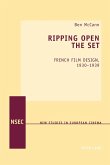Why does the 1974 war in Cyprus remain so dominant in Greek-Cypriot cinema? How has this event shaped the imagination of contemporary filmmakers, and how might one define the new national cinema that has emerged as a result? This book explores such questions by analysing a range of Greek-Cypriot films that have hitherto received little or no critical discussion.
The book adopts a predominantly conceptual approach, situating contemporary Greek-Cypriot cinema within a specific cultural and national context. Drawing on the work of the French philosopher Gilles Deleuze, and particularly his theories of time and space, the author explores ways in which Greek-Cypriot directors invent new forms of imagery as a way of dealing with the crisis of history, the burden of memory and the dislocation of the island's abandoned spaces.
The book adopts a predominantly conceptual approach, situating contemporary Greek-Cypriot cinema within a specific cultural and national context. Drawing on the work of the French philosopher Gilles Deleuze, and particularly his theories of time and space, the author explores ways in which Greek-Cypriot directors invent new forms of imagery as a way of dealing with the crisis of history, the burden of memory and the dislocation of the island's abandoned spaces.








